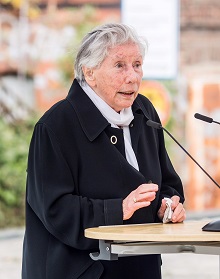Vera Friedländer
Vera Friedländer (actually Veronika Schmidt née Rudau; born on February 27, 1928 in Woltersdorf ; died on October 25, 2019 in Berlin ) was a German writer and survivor of the Holocaust.
Life


Vera Friedländer was persecuted as a “ half-Jew ” during the Nazi era and had to do forced labor . When her mother was arrested at the beginning of March 1943 as part of the “ factory action ” on Grosse Hamburger Strasse in Berlin, when she was just 15, she and her father and other partners from so-called mixed marriages waited many hours in front of the Gestapo collection point. Similar to the persistent women’s protest in Rosenstrasse , the arrested Jews were also released here.
Many members of her family were deported and murdered in Auschwitz , Theresienstadt and other places.
After graduating from the preparatory college , the forerunner of the workers 'and peasants' faculty , Friedland studied German, received his doctorate and qualified as a professor at the Humboldt University in Berlin . She had three children and worked first from 1957 to 1960 as an editor of the literary magazine Die Schatulle and then at Humboldt University. In 1975 she and her husband went to Warsaw , where she taught at the university . In 1982 she received the Jacob and Wilhelm Grimm Prize . From 1982 to 1986 she held a professorship for the German language at Humboldt University.
In 1990 she was a co-founder of the Jewish Cultural Association Berlin . With the support of the association, she founded a language school in Berlin, including for Jewish immigrants from Eastern Europe - today's Friedländer School. Friedländer worked on forced labor research at the Berlin History Workshop and was actively involved in the Stolpersteine project.
Since 2009 there has been a play called Vera , which is based on her texts and in which she herself was on stage with a free theater group at times.
In the late 1980s and early 1990s, Vera Friedländer worked as a writer for the Weltbühne . In 2012 she published an article in the Ossietzky magazine, which is in the tradition of the world stage .
Vera Friedländer died in October 2019 at the age of 91. She was a great-great-granddaughter of Nathan Friedland .
In March 2020, a memorial plaque for the forced laborers of the Salamander company was attached to the former repair shop of the shoe manufacturer in Berlin-Kreuzberg and inaugurated on July 21, 2020.
Positions
About the use of the word “National Socialism”, Vera Friedländer said on October 18, 2018 at the Gleis 17 memorial at Berlin-Grunewald train station and on March 12, 2019 at the Museum Hotel Silber in Stuttgart : “The Nazis coined this word before 1933 to to win over the masses who imagined something worth striving for under socialism. They promised them a national socialism . That was a fraud. For they led the nation to war and they fought socialism. Unfortunately, almost everyone in our country today uses this word as if it were socially prescribed. I name the system of Nazi rule with the word that is used internationally: Fascism , German fascism. All the peoples around us say fascism. Only here is this mendacious, demagogic word "National Socialism" used. I find that very regrettable. "
Works
- Late Notes , Verlag Neues Leben , Berlin 1982. New edition You can't be half a Jew , Agimos-Verlag, Kiel 1993; Trafo-Verlag Berlin 2008, ISBN 9783896267863 . Autobiographical novel.
- German in Episodes - textbook and exercise book for advanced learners , Państwowe Wydawnictwo Naukowe , Warsaw 1985.
- My Polish Neighbor , New Life Publishing House , Berlin 1986.
- Fliederzeit , Verlag Neues Leben, Berlin 1987.
- Four men from over there and other stories , Edition Prott, Berlin 1996.
- A mixed marriage or the small order from Jerusalem , Verlag am Park , Berlin 1998.
- Little history of geographical discoveries . Together with Dr. Erwin Schmidt. Trafo-Verlag, Berlin 2004.
- The children of La Hille . Development of the Taschenbuch Verlag , Berlin 2004.
- A leather pouch. Stories . Trafo-Verlag, Berlin 2008. ISBN 978-3-89626-660-6 .
- I am past and present. Autobiography . Trafo-Verlag, Berlin 2009. ISBN 978-3-89626-930-0 .
- VERA - Late Notes (play, Ed .: Gerd Bedszent ), Trafo-Verlag, Berlin 2012. ISBN 978-3-86465-018-5 .
- Two women in the south of France. 1940 to 1944 , Verlag am Park, Berlin 2014. ISBN 978-3-89793-307-1 .
- Journey into the past , Verlag am Park, Berlin 2015. ISBN 978-3-945-18733-3 .
- I was a forced laborer at Salamander , Das Neue Berlin , Berlin 2016. ISBN 978-3-360-01313-2 .
- Alfred Wohlgemuth - An unsung hero , Verlag am Park, Berlin 2018. ISBN 978-3-947094-09-7 .
Web links
- Literature by and about Vera Friedländer in the catalog of the German National Library
- Salamander forced labor
- Irene Runge: History of the Jewish Cultural Association Berlin
- Video with Vera Friedländer about the history of the Friedländer School
- Film: The Stolen Life (49 min., May 2016, Umbruch Bildarchiv)
- Vera Friedländer: I was a slave laborer at Salamander
- Corina Kolbe: Forced labor at Salamander: They were the shoes of the dead , in: Der Spiegel, September 2, 2016
- Ask us, we're the last! An interview brochure . VVN-BdA Berlin, part 6 of 6 (all parts are online)
Individual evidence
- ↑ Vera Friedländer. In: Kürschner's German Literature Calendar 2018/2019. Volume II: PZ. Walter de Gruyter , 2018, ISBN 978-3-11-057616-0 , p. 254.
- ↑ For the Friedländer-Schule see their homepage
| personal data | |
|---|---|
| SURNAME | Friedländer, Vera |
| ALTERNATIVE NAMES | Schmidt, Veronika |
| BRIEF DESCRIPTION | German writer and survivor of the Holocaust |
| DATE OF BIRTH | February 27, 1928 |
| PLACE OF BIRTH | Woltersdorf |
| DATE OF DEATH | October 25, 2019 |
| Place of death | near Berlin |